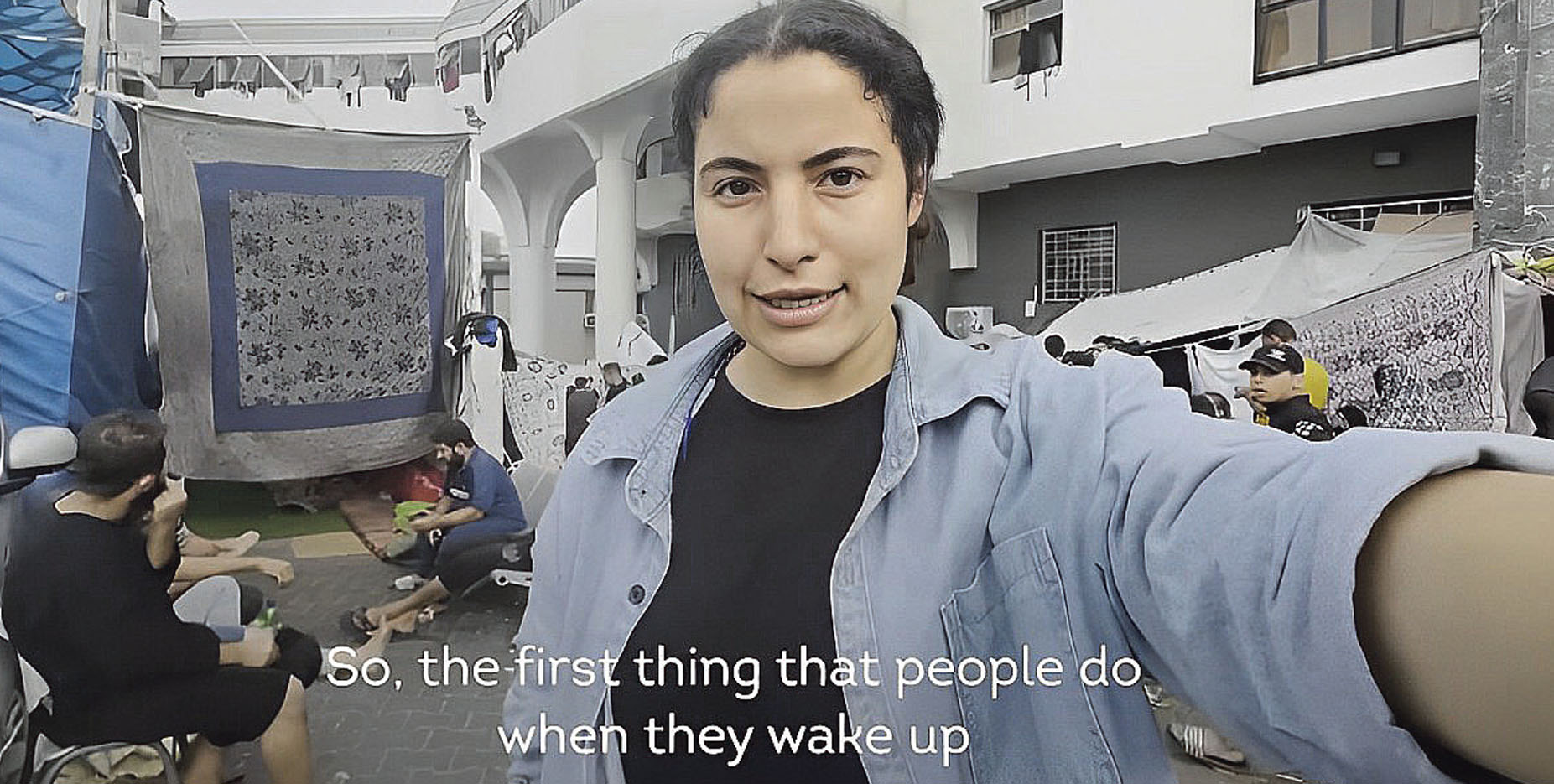
Elham Asaad Buaras
The organisers of the News and Documentary Emmy Awards have defended the nomination of a video report by Bisan Owda, a Palestinian journalist in Gaza, after a pro-Israel lobby group called for her to be removed from the nominees.
Creative Community for Peace (CCP), which campaigns against cultural boycotts of Israel, published an open letter on August 12 urging the National Academy of Television Arts and Sciences (NATAS) to rescind the nomination of the eight-minute documentary “It’s Bisan from Gaza and I’m Still Alive.”
In the video, produced by AJ+, a digital platform of Al Jazeera, Owda captures the reality of life during Israeli airstrikes in late October, filming from a tent near Gaza City’s al-Shifa hospital. The footage features an interview with an 11-year-old orphan whose parents lost their lives in an Israeli attack on their house.
During Israel’s bombardment of Gaza, which began in October 2023, Owda gained global recognition for her frequent video and live stream updates on social media, where she documented the experiences of Palestinian civilians. She became known for beginning her videos with a variation of the phrase, “I’m still alive.” Most of her videos are in English, though some are in Arabic.
Her content has been featured by BBC News, Al Jazeera, ABC News, and Save the Children. In her updates, she has reported on Israeli Occupying Forces (IOF) attacks, as well as the severe shortages of food, shelter, medical care, and other essential resources. By May 2024, Owda had amassed 4.7 million followers on Instagram and 1.2 million on TikTok.
The CCP alleged that Owda was linked with the Popular Front for the Liberation of Palestine (PFLP), stating that she spoke at the political group’s events between 2014 and 2018.
The open letter, 150 people in the entertainment industry, said that elevating Owda “not only legitimises a terrorist organisation, it undermines the integrity of the awards.”
In an August 13 response to CCP, NATAS CEO Adam Sharp affirmed his support for the Emmy nominations. He noted that over the past fifty years, some nominees have been contentious, offering a platform to perspectives that some viewers might find offensive or disturbing.
However, he emphasised that this approach aligns with the journalistic mission to present all aspects of a story.
He added that the organisers were aware of “a then-teenaged Bisan Owda speaking at various PFLP-associated events between six and nine years ago,” but that NATAS was unable to corroborate those reports and that it could not find any evidence that Owda was still involved with the PFLP.
“Most critically, the content submitted for award consideration was consistent with competition rules and NATAS policies,” Sharp added.
Al Jazeera also issued a statement defending Owda, countering what it described as “efforts to silence her reporting from Gaza.” The network emphasised that Owda’s work had “significantly contributed to bringing news from Gaza to the world with her unique style” and denounced the allegations against her as “baseless.”
Additionally, Al Jazeera pointed out that this campaign “present[ed] a real threat to her safety on the ground,” highlighting that “160 journalists, including three from Al Jazeera, have been killed by Israeli forces” since the conflict began.
The national deputy director of the Council on American-Islamic Relations (CAIR) labelled the petition’s signatories as “hypocritical,” contending that the scrutiny directed at Palestinians would not be applied to an Israeli pictured with Israeli Prime Minister Benjamin Netanyahu, who is currently facing arrest warrant applications by the International Criminal Court (ICC) chief prosecutor.
Owda’s short documentary has previously earned two notable honours: a Peabody Award and an Edward R. Murrow Award. She continues to live in Gaza and gained recognition for her social media videos that portray life in the region since Israel’s war began. When she received the Peabody Award in May, Owda dedicated it to university students and others around the world who are protesting in support of Palestine. She expressed her gratitude to everyone “ who took to the streets. To all the people at home who are participating in boycotts. To all the people worldwide, regardless of their religion, colour, and ethnicity,” she said at the time.”
Photo: Bisan Owda captures the reality of life during Israeli airstrikes in late October, filming from a tent near Gaza City’s al-Shifa Hospital(Credit: AJ+/CC)
READ MORE GAZA SIEGE | SPECIAL COVERAGE
Gaza death toll soars past 40k as UN reveals Israel blocks over half of aid deliveries
Adidas apologises to Bella Hadid after dropping her under pressure from pro-Israel lobby
Emmys stands by Palestinian journalist award nomination amid pro-Israel lobby attempts to rescind it